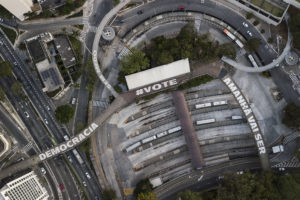For the first time, the government of Brazil is moving forward to criminally prosecute someone responsible for human rights violations committed during the 20-year military dictatorship. Yesterday, seven federal prosecutors representing three different states jointly announced in Brasilia that they would begin moving forward a case against Sebastião Curió Rodrigues de Moura, a retired coronel, for the kidnapping of three men and two women during the military regime.
The five people whose kidnappings are part of this case were part of the Araguaia guerrilla movement in Brazil’s Amazon region in the late 1960s and early 1970s. The government responded aggressively to the guerrillas; in addition to those who died in combat, 62 members of the movement were disappeared during the 1970s. Prosecutors have been working since 2009 to investigate these disappearances, seeking testimony and gathering evidence. They say they now have enough evidence to charge Moura for the disappearance of these five people.
In total, more than 400 people were disappeared during Brazil’s dictatorship, and thousands more were imprisoned and tortured for their opposition to the government. Until now, no one had been prosecuted for human rights abuses committed during the dictatorship because of the 1979 amnesty law. However, yesterday, federal prosecutor Tiago Rabelo argued that forced disappearance is a continuing crime, rather than a single act that took place in the past, and is therefore not covered under the amnesty law. The federal prosecutors also alluded to the fact that there are other ongoing investigations into other crimes committed during the dictatorship, which could lead to other cases of forced disappearance moving forward in the near future.
The case comes after the December 2010 Inter-American Court ruling that Brazil must investigate the whereabouts of the 62 disappeared in Araguaia, make the information public, and try those responsible. Since the ruling, Brazil has passed a landmark Freedom of Information Law and formed a Truth Commission which will seek to further unveil what happened during the years of the dictatorship. These are important steps toward addressing historic human rights violations.
In many other countries throughout Latin America, including Guatemala, El Salvador, Argentina, Peru, and others, cases against military officials, political leaders, and heads of state charged with responsibility for major human rights violations have moved forward or are currently in the judicial process. This Brazilian case against former Coronel Moura shows that Brazil is also taking steps toward acknowledging and addressing crimes of the past, and thereby strengthening accountability and the rule of law.

